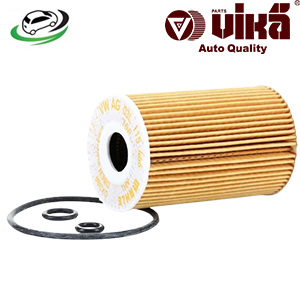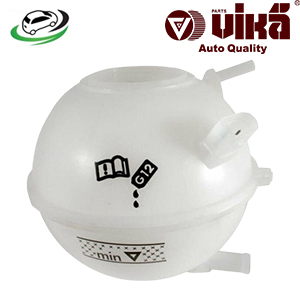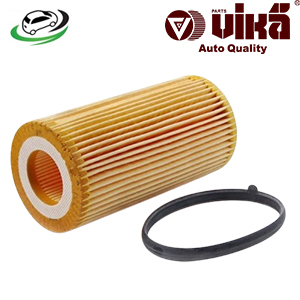-27%
Get Oil Filter Audi 8J TTRS/ 8Y RS 3/ A3 8P/ B7 A4/ RS3/ TT MKII/ TTS / Beetle/ EOS/ Golf R/ Golf V/ Passat B6/B7 06D115562
The oil filter is a fundamental component in an internal combustion engine, responsible for maintaining the cleanliness of the engine oil. Engine oil is crucial for lubricating moving parts, reducing friction, cooling, and preventing wear. However, over time, contaminants such as dirt, metal particles, and carbon deposits can accumulate in the oil, reducing its effectiveness and potentially causing damage to the engine. The oil filter plays a vital role in removing these contaminants, ensuring that the engine oil remains clean and functional, which is essential for the longevity and performance of the engine.
The Purpose of the Oil Filter
The oil filter’s primary function is to trap contaminants in the engine oil before they can circulate through the engine. As the oil flows through the engine, it picks up impurities from various sources. These can include tiny metal shavings from engine wear, soot and carbon particles from combustion, and dirt or debris that may have entered the engine from the environment. If left unchecked, these contaminants can lead to increased engine wear, reduced efficiency, and, in severe cases, engine failure.
By filtering out these harmful particles, the oil filter ensures that only clean oil circulates through the engine. This helps to reduce friction, prevent corrosion, and keep the engine running smoothly. A clean oil filter is essential for maintaining the engine’s performance and extending its lifespan.
Types of Oil Filters
There are several types of oil filters used in modern vehicles, each with its unique design and purpose. The most common types include:
- Full-Flow Filters: Also known as primary filters, full-flow filters are the most common type found in passenger vehicles. They filter all the engine oil before it circulates through the engine. These filters are designed to remove large particles that could cause immediate damage to the engine. Full-flow filters typically use a pleated paper element to trap contaminants while allowing the oil to flow freely.
- Bypass Filters: Bypass filters, or secondary filters, are used in conjunction with full-flow filters in some vehicles, particularly in heavy-duty applications. While full-flow filters remove larger particles, bypass filters are designed to remove smaller contaminants that the primary filter may miss. These filters allow a small portion of the oil to bypass the main flow, passing through a finer filter media before returning to the engine. This helps to improve the overall cleanliness of the oil and extend the life of the engine.
- Cartridge Filters: Cartridge filters are a type of oil filter where the filter element is housed within a reusable canister. The canister is usually made of metal or plastic, and only the filter element needs to be replaced during an oil change. Cartridge filters are becoming more common in modern vehicles due to their environmental benefits, as they produce less waste compared to traditional spin-on filters.
- Spin-On Filters: Spin-on filters are the most widely used type of oil filter in the automotive industry. They consist of a metal canister that contains the filter element. The entire unit is replaced during an oil change, making them easy to install and remove. Spin-on filters are popular due to their convenience and effectiveness.
- Magnetic Filters: Some oil filters include a magnet to capture and hold metallic particles in the oil. Magnetic filters are especially useful in high-performance engines or engines that operate in harsh conditions, where metal particles from engine wear are more likely to be present.
How the Oil Filter Works
The oil filter is typically located near the engine’s oil pump, which pushes the oil through the filter before it circulates through the engine. The filter consists of several key components that work together to remove contaminants from the oil:
- Filter Media: The filter media is the core of the oil filter, responsible for trapping contaminants. It is usually made from a pleated paper or synthetic material designed to capture particles while allowing oil to flow through. The efficiency of the filter media determines how well the filter can remove contaminants from the oil.
- Anti-Drainback Valve: This valve prevents oil from draining out of the filter when the engine is turned off. It ensures that the filter remains full of oil, allowing for immediate lubrication when the engine is restarted. The anti-drainback valve is particularly important in preventing dry starts, which can cause engine wear.
- Pressure Relief Valve: Also known as a bypass valve, this valve allows oil to bypass the filter if it becomes clogged or if the oil is too thick to pass through the filter (e.g., in cold temperatures). This ensures that the engine continues to receive oil even if the filter is blocked, preventing engine damage. However, bypassing the filter means that unfiltered oil can circulate through the engine, so it’s important to replace the filter regularly to avoid this situation.
- Gasket: The gasket seals the oil filter to the engine, preventing oil leaks. It is usually made of rubber and is designed to withstand the high temperatures and pressures within the engine.
Benefits of a Clean Oil Filter
A clean and properly functioning oil filter offers several key benefits, including:
- Improved Engine Performance: By ensuring that only clean oil circulates through the engine, the oil filter helps to reduce friction and wear on engine components. This leads to smoother operation, better fuel efficiency, and improved overall performance.
- Extended Engine Life: Contaminants in the oil can cause damage to the engine over time. A clean oil filter helps to prevent this damage, extending the life of the engine and reducing the likelihood of costly repairs.
- Reduced Emissions: Clean oil and a well-maintained engine produce fewer emissions, contributing to a cleaner environment. An efficient oil filter helps to maintain the engine’s cleanliness, reducing the release of harmful pollutants.
- Cost Savings: Regularly replacing the oil filter is a relatively inexpensive maintenance task that can save money in the long run. By preventing engine damage and extending the life of the engine, a clean oil filter can help to avoid costly repairs and improve the vehicle’s resale value.
Signs of a Failing Oil Filter
An oil filter can become clogged or fail over time, leading to several potential issues. Some common signs of a failing oil filter include:
- Decreased Oil Pressure: A clogged oil filter can restrict the flow of oil to the engine, leading to decreased oil pressure. This can cause the engine to run less efficiently and increase the risk of engine damage.
- Engine Overheating: If the oil filter is clogged, the engine may not receive enough oil to properly lubricate and cool its components. This can lead to overheating, which can cause serious damage to the engine.
- Unusual Engine Noises: A lack of proper lubrication due to a clogged oil filter can cause increased friction within the engine, leading to unusual noises such as knocking or ticking.
- Oil Leaks: A damaged or improperly installed oil filter gasket can cause oil to leak from the filter. This can lead to low oil levels and potential engine damage if not addressed promptly.
- Dirty Exhaust Smoke: If the oil filter is not functioning properly, contaminated oil may burn in the engine, leading to dirty or smoky exhaust emissions.
Replacing the Oil Filter
Replacing the oil filter is a straightforward maintenance task that should be performed regularly as part of an oil change. The frequency of oil filter replacement depends on the vehicle, driving conditions, and the type of oil used. Most manufacturers recommend replacing the oil filter every time the oil is changed, typically every 3,000 to 7,500 miles.
The process for replacing the oil filter generally involves the following steps:
- Drain the Old Oil: Before replacing the filter, the old engine oil needs to be drained. This involves removing the oil drain plug and allowing the oil to flow into a drain pan.
- Remove the Old Filter: The old oil filter is unscrewed from the engine using an oil filter wrench. Care should be taken to prevent oil from spilling during removal.
- Install the New Filter: The new filter is prepared by applying a thin layer of fresh oil to the gasket, which helps to ensure a proper seal. The filter is then screwed onto the engine by hand until snug, and then tightened an additional quarter-turn.
- Refill with Fresh Oil: After the new filter is installed, the engine is refilled with the appropriate type and amount of fresh oil.
Follow us on Facebook for more parts.



